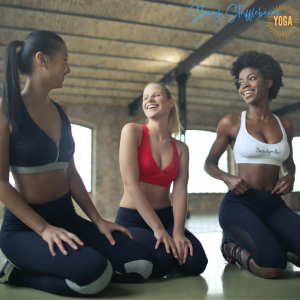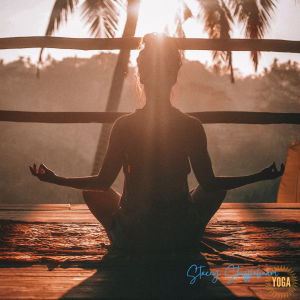It’s no secret that practicing yoga increases the flexibility in our bodies, but another great freedom yoga gives us is that can increase the flexibility of our minds as well. Just as yoga helps our bodies move easier and in new ways, it helps our minds look at situations in new ways too and this mental flexibility is important.
Yoga Develops Mental and Physical Flexibility
Practicing yoga helps us be more present and less stressed. It creates space in our bodies and space for our minds to settle into the present moment and find some peace and quiet. Yoga practice lets us become more flexible in our thinking.
Flexible thinking is the ability to change our way of thinking to find new ways to solve problems. The mindfulness we learn in yoga from staying in the present moment and paying attention to our breath, allows us to take a step back and think before we react.
This quiet attention can feel like an escape from our modern society with all its goal-setting, self-judgment, and competition. It allows us to step away from all the “doing” that may consume the other 23 hours of the day so we can just “be” in our bodies and minds during our class.
Here are a few ways to cultivate mental flexibility through yoga.
1. Have Fun on Your Mat.
I remember my first yoga class. My best friend and I showed up (a little apprehensively) in our stretchy pants with open minds. This was almost 20 years ago; we had no idea what we were getting into or what we were doing. We giggled, we fell out of poses, and we giggled some more. There were poses that I was fairly certain were impossible for the human body to actually accomplish but we didn’t take ourselves too seriously and definitely had a ton of fun!

How can you have more fun on your yoga mat? Take a tip from beginner me: try, make changes, and experiment.
Once you know the proper alignment of a pose, such as downward-facing dog pose, don’t be afraid to make it fit your body. If your shoulders are tight, try moving your hands. I’ve found that taking the hands a little wider and turning them out makes it a lot more sustainable when my shoulders are unusually tight.
Another way to have some fun is to mix it up, make changes. If you only practice vinyasa classes in the morning, try an evening class. Never use props? Try using a block every time you come into triangle pose for the next month. A small adjustment just might give you that beginner’s mindset that you can take back to your favorite class.
2. Let Go of Expectations.
Temporarily set aside the desire to do better and just give yourself permission to notice what’s happening while you’re on your mat. Honestly ask how your body feels in the pose and if going deeper would make your body feel better. Often when we ask, we realize that push is coming not from our body but from our ego’s desire to perform.
Or try asking, “How can I change this pose to find more ease?” Searching for more ease in our bodies, usually helps us let go of a competitive mindset so we can feel better mentally.
Have you tried tuning in for a live online class? These kinds of classes can really tamp down the ego. Because we’re all at home where we feel comfortable and there isn’t a super bendy girl who can do everything “better” on the mat next to you. It’s more like a private class between you and your teacher, so it helps quiet the ego and limit competitiveness.

3. Develop a Growth Mindset.
Yoga is more than pretty pictures posted in our social media feeds. It’s about how it makes us feel better. It is about how we feel more comfortable in our own skin after class. It’s about how we’re kinder and more fun to be around after class.
We all want that, right?
We can create flexibility in our bodies and minds on our yoga mats. The more often we practice yoga just to be on our mats or to enjoy the changes yoga produces without a fixed agenda, the easier is to cultivate that growth mindset and mental flexibility.
According to Carol Dweck, “individuals who believe their talents can be developed (through hard work, good strategies, and input from others) have a growth mindset. They tend to achieve more than those with a more fixed mindset (those who believe their talents are innate gifts). This is because they worry less about looking smart and they put more energy into learning.” We can do this in yoga.
Yoga will give you mental flexibility and change you for the better.
Your yoga practice has the power to transform your body, which is powerful. Yoga, also, has the power to transform your outlook on your life and the world around you.
Every time we get on our mats, we’re stepping onto it with a different body. Your body is different today than it was yesterday, last month, or pre-COVID19. Don’t expect it to perform just like it did then. We’re always growing and evolving. Let go of the idea that our bodies don’t change. Notice the changes and look for ways to feel better today.
And just remember, being more flexible in your body does not make you a better yogi. Listening to your body and its limitations makes you a better yogi. Continue to show up week after week for one reason. We feel better after our yoga class than before it started. It’s not about executing the perfect yoga pose. It is about feeling better in our own skin.
Get on your mat. Stay in the moment. Then witness how you become more flexible in your body and your mind.
This is the fourth article in our Flexible February series. Access the other articles by clicking the links below:
Flexibility for Hips and Hamstrings
Flexibility for Shoulders and Backs
Our weekly articles are for people looking for more joy in their lives. They help us feel better mentally and emotionally through mindfulness and conscious physical movement, which creates more gratitude and contentment both on and off the yoga mat. Don’t miss one! Have them delivered directly to your inbox every Tuesday by signing up below.

